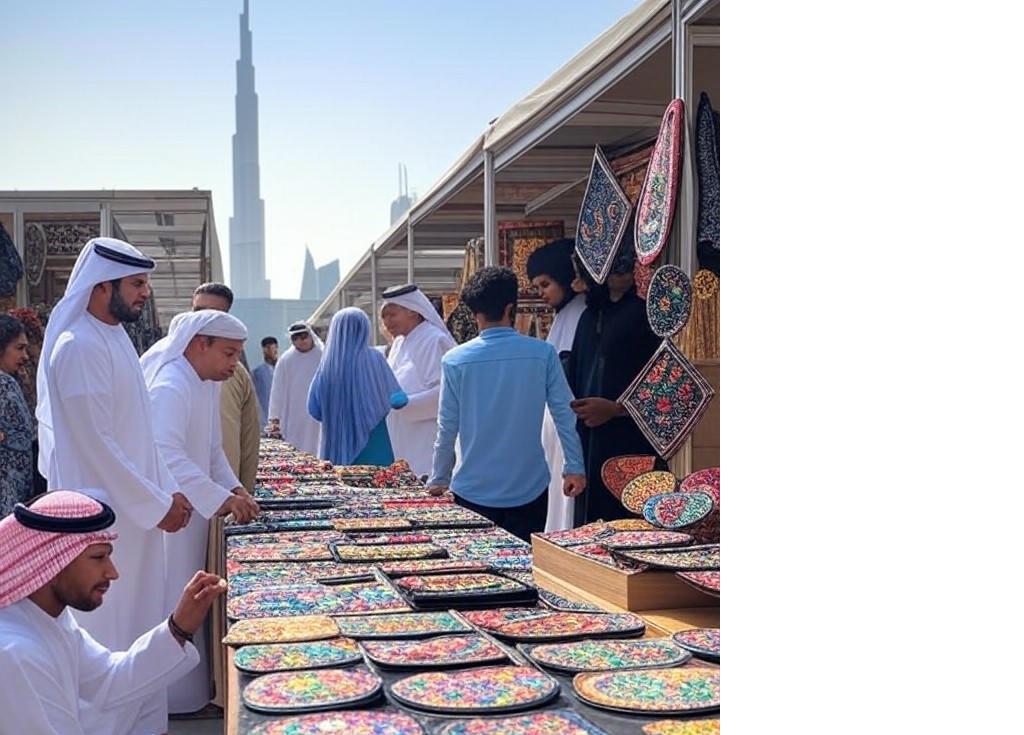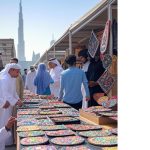Market Analysis and Opportunities
Target Market Analysis
The United Arab Emirates—particularly Dubai—has emerged as a regional hub for e-commerce, driven by a young, tech-savvy population and increasing smartphone penetration. According to Statista, the UAE’s e-commerce market was valued at approximately USD 5 billion in 2023, with projections estimating a compound annual growth rate (CAGR) of 10% through 2028. Within this expanding market, handmade crafts e-commerce stores tap into a dynamic consumer segment that values authenticity, personalization, and cultural craftsmanship.
Key characteristics of Dubai’s handmade crafts market include:
- High purchasing power driven by affluent local and expatriate populations.
- Diversity in consumer backgrounds, leading to demand for unique, multicultural products.
- Preference for sustainable, locally produced, and artisanal goods, in line with global eco-consciousness trends.
- Appreciation for customization and the human story behind each craft item.
Industry trends shaping this space include digital transformation, sustainable consumption, and a shift toward experiences over standardized goods. These trends are reinforced by Dubai government initiatives supporting SMEs and creative enterprises, creating a fertile environment for handmade crafts businesses.
Marketing Needs
Operating in Dubai’s competitive online retail sector requires robust market research and agile marketing strategies. Essential approaches for a Handmade crafts e-commerce store include:
- In-depth consumer research to identify niche interests among residents and tourists (e.g., Emirati motifs, regional calligraphy, or eco-friendly materials).
- Strong digital presence through SEO-optimized e-commerce platforms, localized content, and marketplace integrations with platforms like Noon and Amazon UAE.
- Social media campaigns across Instagram, Facebook, and TikTok to showcase product stories, engage influencers, and drive visual discovery.
- PPC advertising and retargeting to capture high-intent users searching for unique gifts or home décor in Dubai.
- Professional branding to build trust and highlight the store’s origin, values, and artisans.
To enhance competitive positioning, combining targeted digital campaigns with strategic local partnerships (pop-up events, art fairs, collaboration with tourism brands) is recommended.
Expansion Potential
Dubai’s business-friendly environment provides a launchpad for regional and global expansion. Opportunities for growth include:
- Geographic expansion into other Emirates (Abu Dhabi, Sharjah) and the GCC, leveraging Dubai’s logistical advantages.
- Diversification into B2B channels (corporate gifts, hospitality supplies) and export to international markets, capitalizing on Dubai’s reputation as a trading gateway.
- Adding product categories or bespoke services (customization, workshops) to attract new demographics.
- Leveraging cross-border e-commerce and participation in international expos or online marketplaces.
Comprehensive Business Overview
Handmade crafts e-commerce stores in Dubai operate at the intersection of art, culture, and digital retail. Rooted in the creative industries, this business model connects artisans and independent creators with consumers seeking distinctive, artisanal products. The core offerings typically include home décor, jewelry, clothing, accessories, stationery, and personalized gifts—curated for the UAE’s multicultural, design-forward audience.
The business model is primarily direct-to-consumer (D2C), leveraging e-commerce platforms and logistics partners to deliver products across the UAE. Some ventures also enable third-party sellers (marketplace model), increasing the breadth of inventory and choice.
Target audiences in Dubai encompass:
- Affluent UAE nationals and long-term expats with an appetite for unique, high-quality goods.
- Tourists searching for meaningful souvenirs or cultural items.
- Corporate buyers seeking premium locally-made gifts for events.
The typical business location is either a Dubai Free Zone (to benefit from 100% foreign ownership, tax exemptions, and simplified setups) or the mainland (offering direct access to the UAE market and government clients).
Mission: To champion authentic craftsmanship, empower local artisans, and provide UAE consumers with accessible, high-quality handmade products curated for modern lifestyles.
Vision: To become the UAE’s leading handmade crafts e-commerce destination, recognized for quality, sustainability, and cultural impact.
Core Objectives:
- Support and promote local creators.
- Deliver personalized customer experiences through unique offerings.
- Advance sustainable and ethical business practices in the UAE.
Most Handmade crafts e-commerce stores in Dubai typify the startup or early growth stage, with scope for rapid scaling amid favorable business conditions.
Competitive Advantage
Entrepreneur Perspective
For founders, Handmade crafts e-commerce stores offer:
- Low entry barriers compared to traditional retail—no need for high-rent physical outlets, with streamlined e-commerce licensing available in Free Zones.
- Ability to leverage personal branding, storytelling, and curated supply to differentiate from mass-market competitors.
- Potential to monetize unique skills or cultural heritage in a region that values creative entrepreneurship.
Investor Perspective
From an investment standpoint, the model presents:
- Exposure to a high-growth e-commerce sector in Dubai with consumer demand for artisanal goods.
- Opportunity to achieve compelling returns from scalable digital operations and cross-border sales potential.
- Risk mitigation through product diversification and variable cost structures—inventory can be on-demand or dropshipped to reduce financial exposure.
- Ability to tap into the global interest in sustainable, ethical consumption—an angle increasingly favored by Middle East investors.
Manager Perspective
Operational or strategic advantages for managers include:
- End-to-end control over sourcing, curation, and branding to ensure quality and customer satisfaction.
- Integration of proprietary technology (custom e-commerce platforms, AI-driven recommendations) to optimize user experiences.
- Possibility to forge exclusive partnerships with local artisans, tourism boards, or hospitality groups.
- Agility to pilot new products or campaigns with quick go-to-market turnaround in Dubai’s experimental consumer market.
For example, partnerships with eco-friendly packaging suppliers or exclusive collaborations with Emirati designers can strengthen UVP and market differentiation.
Financial and Investment Needs
Financial Requirements
Initial capital requirements for launching a Handmade crafts e-commerce store in Dubai generally range between AED 200,000 and AED 500,000 for a lean startup model. Typical costs include:
- Company setup and licensing: AED 25,000 – AED 35,000 (depending on Free Zone or mainland jurisdiction).
- Website and technology development (platform, payment integration, mobile optimization): AED 50,000 – AED 100,000.
- Initial marketing and branding campaigns: AED 50,000 – AED 120,000 (covering SEO, PPC, influencer partnerships).
- Inventory procurement or consignment agreements: AED 25,000 – AED 80,000.
- Staffing and administrative costs: AED 60,000 – AED 120,000 annually.
- Warehouse or fulfillment solutions: AED 20,000 – AED 50,000 for a small-scale operation.
Investment Potential
Handmade crafts e-commerce aligns well with the interests of venture capital and angel investors seeking scalable, tech-driven, and impact-oriented opportunities in the UAE. Compelling attributes for investors include:
- Strong market growth and diversification opportunities.
- Moderate startup costs with rapid scalability.
- Pathways to positive cash flows through recurring business (gift seasons, corporate orders).
- Exit potential via acquisition by larger e-commerce or retail players.
Investment structures may include equity partnerships, convertible debt, or revenue-share agreements based on stage and risk appetite. For tailored support in structuring attractive investment deals, stakeholders can consult specialized investment consulting services.
Financial Risks and Mitigation
Key financial risks include:
- Cash flow volatility due to seasonal demand spikes or marketing costs.
- Currency risk for imported materials or cross-border sales.
- Relatively high initial marketing spend to gain traction in Dubai’s crowded market.
Risk management tactics involve:
- Phased scaling of inventory and marketing investment.
- Diversifying revenue streams (B2B, customization, events).
- Maintaining lean operations and using local suppliers to reduce currency risk.
- Securing comprehensive insurance and legal protections (contracts, IP registration).
Human Resources and Recruitment
Workforce Needs
A Handmade crafts e-commerce store typically requires:
- Permanent staff: E-commerce manager, operations/logistics coordinator, digital marketing specialist, customer service representative.
- Specialized/contractual roles: Website developer, photographer, SEO consultant, social media manager, supply chain expert.
- Potentially, direct artisans or relationships with external craft suppliers.
Critical skills include e-commerce management, digital marketing, branding, user experience (UX) design, and local market knowledge.
HR Challenges and Solutions
Common HR challenges in the UAE include talent competition (especially in tech and marketing), higher compensation expectations, and cultural integration. Effective strategies are:
- Offering competitive salaries and benefits, such as professional development, health insurance, and remote work options.
- Developing talent pipelines via internships or partnerships with local universities.
- Investing in staff training on local culture and customer service excellence.
Compliance with UAE Labor Laws
The UAE mandates strict compliance with labor regulations, including:
- Securing work visas and labor contracts for all expat employees.
- Providing end-of-service benefits and adhering to maximum working hours and leave entitlements.
- Implementing health and safety protocols in line with UAE standards.
To ensure adherence, new businesses are encouraged to work with HR advisors or consultants, and stay current with labor law updates.
Infrastructure and Operations
Infrastructure Needs
Despite being digital-first, a Handmade crafts e-commerce store requires:
- Virtual office space (for admin, remote work, and digital meetings) or cost-effective co-working setups in Dubai Free Zones.
- Reliable cloud-based software for website hosting, inventory management, and customer relationship management (CRM).
- Access to fulfillment centers (3PL providers or local partners) for efficient order delivery.
- Quality hardware (computers, professional cameras for product photos, mobile devices).
Operational Optimization
Typical operational weaknesses include manual inventory management, slow fulfillment, or inefficient customer service. Actionable improvements are:
- Implementation of ERP software to automate inventory, orders, and accounting.
- Adoption of AI-driven chatbots for customer support.
- Integration with local couriers for same-day delivery in Dubai.
Legal Compliance
Operating in Dubai requires:
- Company registration through Dubai Department of Economic Development (DED) or Free Zone authority.
- Obtaining relevant e-commerce and trading licenses.
- Setting up a UAE corporate bank account compliant with Central Bank regulations.
Periodic legal reviews and use of business setup consultants are advisable to avoid costly compliance issues.
Innovation and Technology
Leveraging technology is critical:
- Mobile-first websites and apps to match UAE’s digital consumption patterns.
- Data analytics for customer insights, inventory planning, and marketing.
- AR/VR for virtual craft showcases or customization tools.
- Blockchain for provenance or secure payment integrations.
Adopting these tools boosts competitiveness and scalability.
Marketing and Branding Strategies
Brand Status
Handmade crafts e-commerce stores must prioritize:
- Consistent visual identity reflecting the blend of local and global aesthetics.
- Storytelling to highlight artisan backgrounds, craftsmanship, and cultural heritage.
- Loyalty programs or membership options to foster repeat business.
Areas for improvement include deeper localization (e.g., Arabic-language copy) and enhanced trust signals (certifications, authentic reviews).
Marketing Channels
Effective use of:
- SEO for ranking on “handmade gifts Dubai”, “artisanal home décor UAE”, and other high-intent keywords.
- PPC (Google Ads, Facebook Ads) targeting affluent consumers and tourists.
- Social media (Instagram, TikTok) for visual storytelling and influencer collaborations.
- Content marketing via blogs and newsletters featuring artisan interviews or craft guides—see industry blog resources for inspiration.
Offline presence at art fairs or pop-up stores can also enhance community engagement.
360-Degree Campaigns
Comprehensive campaigns could include:
- “Meet the Maker” video series across social and email channels.
- Seasonal themed promotions (e.g., Eid, Ramadan, Expo seasons).
- Collaborative online and offline events, such as partnerships with Dubai’s art galleries or tourism venues.
- PR and media features in Dubai lifestyle magazines and events—see industry news for potential opportunities.
Growth and Development Potential
Growth Strategies
Existing and potential strategies:
- Broaden online presence via regional sales platforms and international shipping options.
- Launch corporate gifting programs and collaborate with Dubai hotels or event organizers.
- Enable create-your-own or personalization options to tap into Dubai’s luxury segment.
- Form strategic partnerships with entities supporting local SMEs or women entrepreneurs.
Networking
Active engagement with:
- Local government (Dubai SME, Dubai Chamber of Commerce).
- Strategic suppliers and logistics partners to support scale and reliability.
- Business facilitators with extensive regional connections—like Persian Horizon, whose network spans multiple countries.
These relationships unlock new market and partnership opportunities.
International Potential
Dubai’s infrastructure (world-class airports, digital connectivity), tax incentives, and trade logistics make it an ideal gateway for expanding handmade crafts exports globally. Multilingual websites, international shipping agreements, and digital marketing targeting GCC and EU customers are recommended steps.
Sustainability and Innovation
The business can align with Dubai’s Vision 2030 by:
- Sourcing eco-friendly materials and minimizing packaging waste.
- Supporting local communities and fair trade artisan collectives.
- Adopting green logistics partners and carbon-neutral delivery options.
Eco-certifications and public green pledges will enhance market positioning among discerning consumers.
Alignment with Dubai’s Market
Cultural Alignment
Success in Dubai’s multicultural society depends on:
- Curating collections that respect local traditions while appealing to international tastes.
- Offering Arabic-language customer support and digital content.
- Participating in local cultural festivals and events.
Proposed adaptations include seasonal Ramadan/Eid offerings and limited-edition collaborations with Emirati artists.
Local Regulatory Compliance
Handmade crafts e-commerce stores must observe all UAE commercial, tax, and labor laws. Gaps can be closed by:
- Regular compliance audits with expert consultants.
- Proper VAT registration and filings.
- Transparent customer terms and conditions.
Advantages of Dubai
Operating in Dubai provides:
- Access to zero corporate and personal income taxes for Free Zone entities.
- State-of-the-art logistics and supply chain infrastructure.
- Global market connectivity and government support for innovation and SMEs.
Examples include streamlined visa processing, 100% repatriation of profits, and specialized SME financing programs.
Local Challenges and Solutions
Challenges:
- Intense competition from established e-commerce giants and global platforms.
- High digital marketing costs for customer acquisition.
- Stringent regulatory requirements and periodic fee adjustments.
Solutions:
- Focus on niche strengths (local culture, sustainability) rather than mass-market competition.
- Adopt lean operations and data-driven marketing for cost efficiency.
- Leverage government incentives and industry associations for support.
Conclusion
The Handmade crafts e-commerce store presents a compelling business opportunity in Dubai, supported by robust consumer demand, a vibrant entrepreneurial ecosystem, and forward-looking government policies. With the right blend of cultural sensitivity, technological investment, and sustainable business practices, this model offers excellent value potential for entrepreneurs, investors, and business managers alike.
Key recommendations for stakeholders:
- Pursue differentiated branding and high-quality digital experiences to stand out.
- Leverage Dubai’s strategic location and regulatory benefits for regional and global growth.
- Invest in comprehensive compliance, HR, and operational excellence to build a resilient business.
- Capitalize on Dubai’s focus on sustainability and cross-border trade for long-term relevance.
Call-to-Action
If you are considering launching or scaling your Handmade crafts e-commerce store—or seeking investment, market entry, or strategic partnerships in Dubai—explore the dedicated business setup and consulting services offered by Persian Horizon. Their deep market insights and extensive regional network can help turn your vision into a thriving business in the heart of the UAE.








